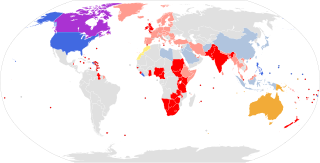External links
| | This article about a dictionary is a stub. You can help Wikipedia by expanding it. |
Merriam-Webster's Dictionary of English Usage (MWDEU) is a usage dictionary published by Merriam-Webster, Inc., of Springfield, Massachusetts . It is currently available in a reprint edition (1994) ISBN 0-87779-132-5 or ISBN 978-0-87779-132-4. (The 1989 edition did not include Merriam- in the title. It was added as part of the rebranding campaign to emphasize the differences between Merriam-Webster's dictionaries and dictionaries of other publishers using the generic trademark Webster's.)
The book has been praised by language experts. Stan Carey at the blog Sentence First concludes that it operates "in such a thorough and unbiased way is what elevates MWDEU so far above the ordinary. Each entry is presented in a much broader context than is typically the case in books that advise on English usage and style." [1] It is critically acclaimed by the linguist Geoffrey Pullum, who calls it "the best usage book I know of... utterly wonderful." [2] The Economist included it in its list "What to read to become a better writer," stating, "What distinguishes MWDEU is its relentless empiricism." [3] It is known for its historical scholarship, analysis, use of examples, and descriptive approach. It has more than 2,300 entries, and includes more than 20,000 quotations from prominent writers. [4]
A concise version is also available.
Singular they, along with its inflected or derivative forms, them, their, theirs and themselves, is a gender-neutral third-person pronoun. It typically occurs with an indeterminate antecedent, in sentences such as:
A split infinitive is a grammatical construction in which an adverb or adverbial phrase separates the "to" and "infinitive" constituents of what was traditionally called the "full infinitive", but is more commonly known in modern linguistics as the to-infinitive. In the history of English language aesthetics, the split infinitive was often deprecated, despite its prevalence in colloquial speech. The opening sequence of the Star Trek television series contains a well-known example, "to boldly go where no man has gone before", wherein the adverb boldly was said to split the full infinitive, to go. Multiple words may split a to-infinitive, such as: "The population is expected to more than double in the next ten years."

The Elements of Style is an American English writing style guide in numerous editions. The original was written by William Strunk Jr. in 1918, and it was published by Harcourt in 1920, comprising eight "elementary rules of usage," ten "elementary principles of composition," "a few matters of form," a list of 49 "words and expressions commonly misused," and a list of 57 "words often misspelled." E. B. White greatly enlarged and revised the book for publication by Macmillan in 1959. That was the first edition of the so-called Strunk & White, which Time recognized in 2011 as one of the 100 best and most influential books written in English since 1923.
A dangling modifier is a type of ambiguous grammatical construct whereby a grammatical modifier could be misinterpreted as being associated with a word other than the one intended. A dangling modifier has no subject and is usually a participle. A writer may use a dangling modifier intending to modify a subject while word order may imply that the modifier describes an object, or vice versa.

In the English language, there are grammatical constructions that many native speakers use unquestioningly yet certain writers call incorrect. Differences of usage or opinion may stem from differences between formal and informal speech and other matters of register, differences among dialects, and so forth. Disputes may arise when style guides disagree with each other, or when a guideline or judgement is confronted by large amounts of conflicting evidence or has its rationale challenged.

Englishauxiliary verbs are a small set of English verbs, which include the English modal verbs and a few others. Although definitions vary, as generally conceived an auxiliary lacks inherent semantic meaning but instead modifies the meaning of another verb it accompanies. In English, verb forms are often classed as auxiliary on the basis of certain grammatical properties, particularly as regards their syntax. They also participate in subject–auxiliary inversion and negation by the simple addition of not after them.
Relative clauses in the English language are formed principally by means of relative pronouns. The basic relative pronouns are who, which, and that; who also has the derived forms whom and whose. Various grammatical rules and style guides determine which relative pronouns may be suitable in various situations, especially for formal settings. In some cases the relative pronoun may be omitted and merely implied.

The passive voice in English is a grammatical voice whose syntax is marked by a subject followed by a stative verb complemented by a past participle. For example:

Despite the various English dialects spoken from country to country and within different regions of the same country, there are only slight regional variations in English orthography, the two most notable variations being British and American spelling. Many of the differences between American and British English / Commonwealth English date back to a time before spelling standards were developed. For instance, some spellings seen as "American" today were once commonly used in Britain, and some spellings seen as "British" were once commonly used in the United States.

In English grammar, the personal pronoun you can often be used in the place of one, the fourth-person singular impersonal pronoun, in colloquial speech.

The Latin adverb sic inserted after a quoted word or passage indicates that the quoted matter has been transcribed or translated exactly as found in the source text, complete with any erroneous, archaic, or otherwise nonstandard spelling, punctuation, or grammar. It also applies to any surprising assertion, faulty reasoning, or other matter that might be interpreted as an error of transcription.

Webster's Third New International Dictionary of the English Language, Unabridged was published in September 1961. It was edited by Philip Babcock Gove and a team of lexicographers who spent 757 editor-years and $3.5 million. The most recent printing has 2,816 pages, and as of 2005, it contained more than 476,000 vocabulary entries, 500,000 definitions, 140,000 etymologies, 200,000 verbal illustrations, 350,000 example sentences, 3,000 pictorial illustrations and an 18,000-word Addenda section.
Fewer versus less is the debate revolving around grammatically using the words fewer and less correctly. The common perspective of today is that fewer should be used with nouns for countable objects and concepts. On the other hand less should be used only with a grammatically singular noun. This distinction was first expressed by grammarian Robert Baker in 1770, and has been supported as a general rule since then by other notable grammarians. However, a more recent perspective based on current usage notes that, while the rule for fewer stands, the word less is used more fluidly.
The recency illusion is the belief or impression that a word or language usage is of recent origin when it is long-established. The term was coined by Arnold Zwicky, a linguist at Stanford University primarily interested in examples involving words, meanings, phrases, and grammatical constructions. However, use of the term is not restricted to linguistic phenomena: Zwicky has defined it simply as, "the belief that things you have noticed only recently are in fact recent".
A false, coined, fake, bogus or pseudo-title, also called a Time-style adjective and an anarthrous nominal premodifier, is a kind of appositive phrase before a noun predominantly found in journalistic writing. It formally resembles a title, in that it does not start with an article, but is a common noun phrase, not a title. An example is the phrase convicted bomber in "convicted bomber Timothy McVeigh", rather than "the convicted bomber Timothy McVeigh".
The word "ain't" is a contraction for am not, is not, are not, has not, and have not in the common English language vernacular. In some dialects, ain't is also used as a contraction of do not, does not, and did not. The development of ain't for the various forms of to be not, to have not, and to do not occurred independently, at different times. The usage of ain't for the forms of to be not was established by the mid-18th century and for the forms of to have not by the early 19th century.

This list comprises widespread modern beliefs about English language usage that are documented by a reliable source to be misconceptions.
Comprised of is an expression in English that means "composed of". This is thought by language purists to be improper because to "comprise" can already mean to "be composed of", and by that definition, "comprised of" would be ungrammatical. However, another widely accepted definition of to "comprise" is to "compose", hence the commonly accepted meaning of "comprised of" as "composed of".

The inanimate whose refers to the use in English of the relative pronoun whose with non-personal antecedents, as in: "That's the car whose alarm keeps waking us up at night." The construction is also known as the whose inanimate, non-personal whose, and neuter whose.